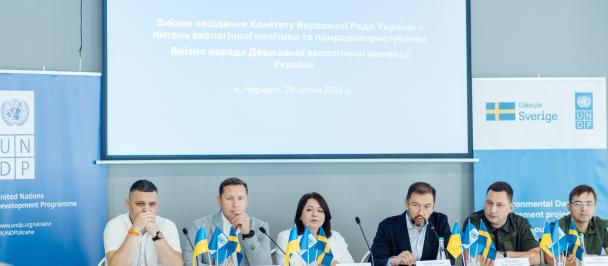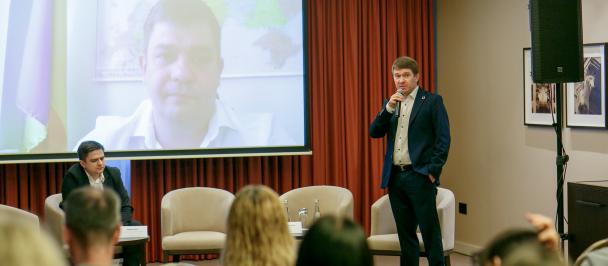The Mykolaiv residential complex won a competition among Home Owners Associations from 11 cities across Ukraine that took part in an educational programme on composting in cities.
Photo courtesy PLATO NGO
In October 2021, the “Community Safari: Composting in Cities” educational programme was organized by the Plato NGO, with support from the United Nations Development Programme (UNDP) in Ukraine. This fifth safari organised by UNDP’s Accelerator Lab attracted a record number of participants – 357.
The project also included a competition among apartment buildings, with the main prize being to host a pilot initiative to set up a composting site near a residential complex.
The "Community Safari" format focuses on involving active residents in finding nature-based solutions in response to the most pressing environmental challenges. Such challenges could be the effects of climate change, the depletion of biodiversity, and the irrational use of natural resources, while the solutions could be green roofs, rain gardens, pergolas, hedges, flower meadows, and others. The Community Safari format was developed by UNDP’s Accelerator Labs in Ukraine, and has already been tested in several Ukrainian cities – Kyiv, Lviv and Bila Tserkva.
Olena Tarasova-Krasieva, the coordinator of the UNDP project "Nature-based Solutions for Sustainable Cities in Ukraine" says that this time the focus was on the topic of the irrational treatment of organic waste.
"As part of the training course, we tried to show the students that food and garden waste should not be a problem," says Tarasova-Krasieva. “Composting is a convenient and effective solution for returning organic matter to the ecosystem.”
More than 350 participants from 111 communities took part in an online training course, which lasted from 19 to 21 October, during which they learned about the relationship between organic waste and the deepening climate crisis and environmental degradation, as well as about composting methods and principles. As a separate educational unit, it was proposed that they study successful Ukrainian and foreign practices of organic composting by apartments, houses and communities. After this training, residents of apartment buildings had the opportunity to participate in a competition to set up a full composting process in their apartment building.
Serhiy Kolesnyk from Mykolayiv, a member of the board of one of the five Home Owners Associations of the Aurora residential complex, which has almost 1,500 inhabitants, won the competition. As well as installing a composting site, the competition organizers and experts will help Serhiy establish the procedure for sorting organic matter by conducting training and providing information materials.
Residents of the residential complex where Serhiy lives have been sorting recyclables for three years, but they did not participate in the Community Safari.
Serhiy said that his main motivation was his desire to find a solution to reduce the amount of solid waste going to the city landfill. "Of course, a centralized municipal composting system is still an unattainable dream," says Serhiy, "But creating individual examples at the level of apartment blocks could be the first step to popularising this idea and achieving the desired goal. I’m ready to take responsibility for composting in our block."
In total, representatives of 13 apartment buildings in Kyiv, Vinnytsia, Odesa, Mariupol, Zhytomyr, Dobropillya, Mykolayiv, Lutsk, Myrnohrad, Bucha, and Ukrainka took part in the competition. The participants were evaluated on their level of motivation, previous experience in implementing initiatives in an apartment building, the feasibility of installing a composting site, and so on.
Reference
The Community Safari concept was developed by the UNDP in Ukraine’s Accelerator Lab – a UNDP global initiative aimed at identifying, developing and disseminating innovative and sustainable solutions for local communities.
Community Safari is an adventure that brings community members together to collectively identify, discuss, and find ideas to solve community problems and plan actions using nature-oriented solutions.
Photos courtesy Plato NGO

 Locations
Locations










